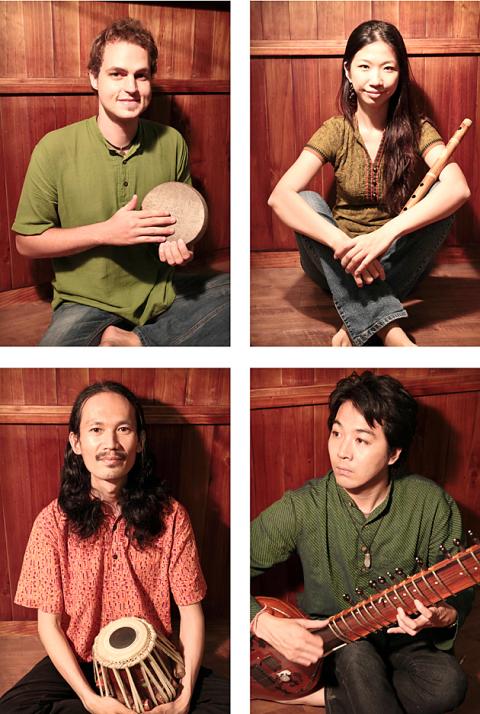World music and blues fans have plenty of choices for live music this weekend, with two mini-festivals featuring prominent local performers taking place in Taipei.
Tonight, Indian music troupe Coromandel Express kicks off a series of shows at the Red House Theater (西門紅樓) featuring performers of ethnic music.
The quartet, which consists of Japanese expats Toshihiro Wakaike and Ryohei Kanemitsu, American expat percussionist Cody Byassee and flutist and harpist Paige Su (蘇珮卿), combines elements of jazz improvisation with the classical music styles of North and South India.

PHOTOS COURTESY OF COROMANDEL EXPRESS
The music of the two regions will sound similar to untrained ears. Both employ the use of ragas, the melodic modes that make up the distinctive sound of classical Indian music. Wakaike, who plays the tabla, and Kanemitsu, who plays the sitar, are long-time students of Hindustani music of Northern India.
Byassee and Su, who are both formally trained in jazz and classical music, are also devoted students of Indian music, but they focus on the South’s Carnatic tradition, which emphasizes vocals more than Hindustani music. Su, who is also a jazz singer, composes and sings original material with the group.
At Coromandel Express’ show, the organizers are giving away free T-shirts to the first 20 people to enter the venue, and Indian milk tea will also be served throughout the evening.

PHOTO COURTESY OF Shun Kikuta
A Moving Sound (聲動劇場) appears at the Red House Theater tomorrow for a performance that follows on the heels of its recent US tour. The group’s music, which draws from traditional Taiwanese folk and Western pop and is driven by the avant-garde sensibilities of dancer and vocalist Mia Hsieh (謝韻雅), has started to earn acclaim abroad. Several months ago, A Moving Sound featured in a segment on Taiwanese music on National Public Radio’s All Things Considered program in the US. Tomorrow afternoon’s show is a chance to catch A Moving Sound in a comfortable setting for the group — the Red House Theater is one of its preferred venues.
Later tomorrow evening, Belgian expat jazz bassist Martijn Vanbuel and his group, the Golden Melody Award-winning Orbit Folks, take to the stage. Vanbuel, who also picked up a best producer gong for Orbit Folks’ album The Missing Link (失落的環節), says the group has prepared new compositions to be performed with a string quartet at tomorrow’s show.
As a composer and bandleader, Vanbuel’s interests lie in placing ethnic folk in a jazz context. Orbit Folks’ debut album featured adaptations of traditional Central Asian, Jewish and Balkan folk songs, and concertgoers can expect to hear music in this vein.
Autumn has traditionally been the season for Blues Bash, the annual blues festival started in Taipei by American expat DC Rapier, who is the founder and head of the Blues Society on Taiwan.
This year’s Bash, which is now in its eighth run, is going to be a smaller-scale event than past editions and will take place tomorrow evening at the Dreamgirls (夢幻女郎俱樂部) club at the Core Pacific City Mall (京華城).
Rapier says that personal commitments nearly forced him to cancel this year’s festival, but with the encouragement and help of several musicians from the local blues scene, he decided to hold a smaller party “to keep the idea of Blues Bash alive.”
He plans to move Blues Bash to either late spring or early summer next year, to avoid conflicting with other events in the fall, traditionally a busy season on the cultural calendar.
This year’s Blues Bash features eight groups, including headliner and regular Blues Bash performer Shun Kikuta, a Japanese musician best known as the former guitarist for female blues legend Koko Taylor. Kikuta left Chicago shortly after Taylor died in 2009, and now divides his time between performing in Japan, the US and Taiwan, where he teaches part-time.
Other performers include Rapier’s band Bopomofo (ㄅㄆㄇㄈ), local blues and psychedelic rock mavens the Blues Vibrations, my own group the Muddy Basin Ramblers and Japanese female singer Nacomi, who performs pop and R ’n’ B-infused blues along the lines of Bonnie Raitt. There will also be a short performance from an unusual lineup consisting of a marimba player, Pascal Pons, and a cellist, Frederic Audibert. The two will participate in a blues jam with Kikuta and drummer Chris Wabich, and their performance will set out to demonstrate that blues can be performed on unconventional instruments, Rapier says.
Dreamgirls, which is a lounge bar (yes, it’s named after the movie), may not seem like a first-choice venue for a blues festival, but Rapier says it was the best possible place given the last-minute decision to hold the event. He says that the venue will be making adjustments to accommodate the event by moving out the furniture to give the audience room to dance.
The Blues Society on Taiwan will be selling Asahi beer at NT$100 a can and holding a raffle with prizes that include an electric guitar, harmonicas and hand drums. The event ends at 10:30pm, but the party will continue with a blues jam at Bobwundaye, 77, Heping E Rd Sec 3, Taipei City (台北市和平東路三段77號).
World Music performances at the Red House Theater
Coromandel Express, 7:30pm to 10:30pm, tonight
A Moving Sound, 2:30pm to 5:30pm, tomorrow
Orbit Folks, 7:30pm to 9pm, tomorrow
Address: The Red House Theater (西門紅樓), 10 Chengdu Rd, Taipei City (台北市成都路10號)
Admission: Tickets are NT$500 for each show, and can be purchased online through www.artsticket.com.tw
Blues Bash 8
All shows take place tomorrow night.
Funsong Band, 5:10pm
Taipei Rockets 88, 5:35pm
Kenyatta Funksters, 6pm
BB Cooky and Stevie, 6:25pm
Blues Vibrations, 7pm
David Chen and the Muddy Basin Ramblers, 7:40pm

In the March 9 edition of the Taipei Times a piece by Ninon Godefroy ran with the headine “The quiet, gentle rhythm of Taiwan.” It started with the line “Taiwan is a small, humble place. There is no Eiffel Tower, no pyramids — no singular attraction that draws the world’s attention.” I laughed out loud at that. This was out of no disrespect for the author or the piece, which made some interesting analogies and good points about how both Din Tai Fung’s and Taiwan Semiconductor Manufacturing Co’s (TSMC, 台積電) meticulous attention to detail and quality are not quite up to

April 21 to April 27 Hsieh Er’s (謝娥) political fortunes were rising fast after she got out of jail and joined the Chinese Nationalist Party (KMT) in December 1945. Not only did she hold key positions in various committees, she was elected the only woman on the Taipei City Council and headed to Nanjing in 1946 as the sole Taiwanese female representative to the National Constituent Assembly. With the support of first lady Soong May-ling (宋美齡), she started the Taipei Women’s Association and Taiwan Provincial Women’s Association, where she

Chinese Nationalist Party (KMT) Chairman Eric Chu (朱立倫) hatched a bold plan to charge forward and seize the initiative when he held a protest in front of the Taipei City Prosecutors’ Office. Though risky, because illegal, its success would help tackle at least six problems facing both himself and the KMT. What he did not see coming was Taipei Mayor Chiang Wan-an (將萬安) tripping him up out of the gate. In spite of Chu being the most consequential and successful KMT chairman since the early 2010s — arguably saving the party from financial ruin and restoring its electoral viability —

It is one of the more remarkable facts of Taiwan history that it was never occupied or claimed by any of the numerous kingdoms of southern China — Han or otherwise — that lay just across the water from it. None of their brilliant ministers ever discovered that Taiwan was a “core interest” of the state whose annexation was “inevitable.” As Paul Kua notes in an excellent monograph laying out how the Portuguese gave Taiwan the name “Formosa,” the first Europeans to express an interest in occupying Taiwan were the Spanish. Tonio Andrade in his seminal work, How Taiwan Became Chinese,